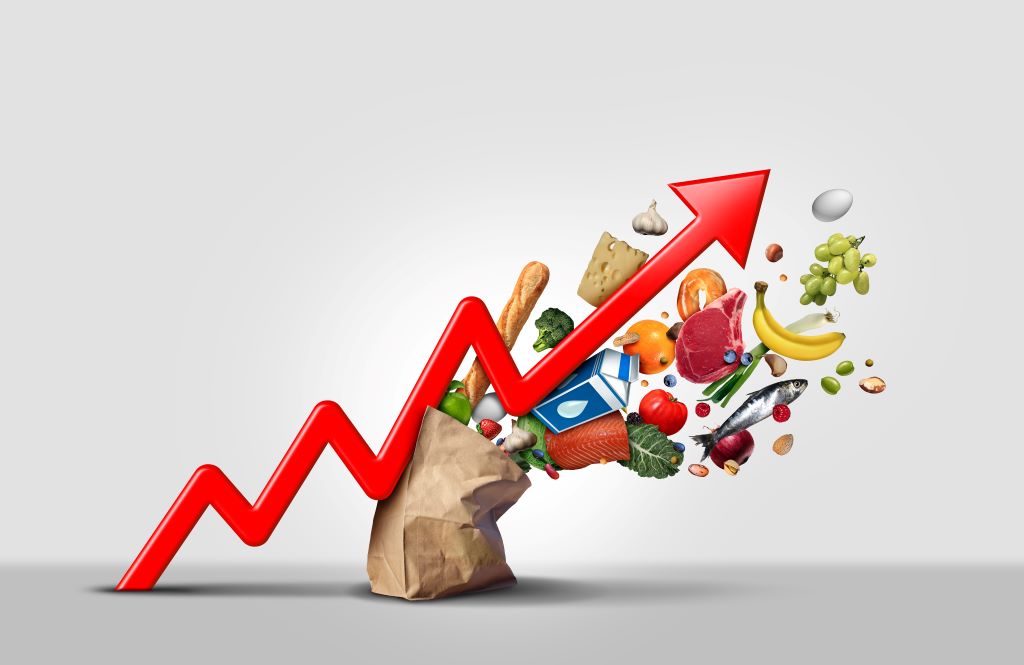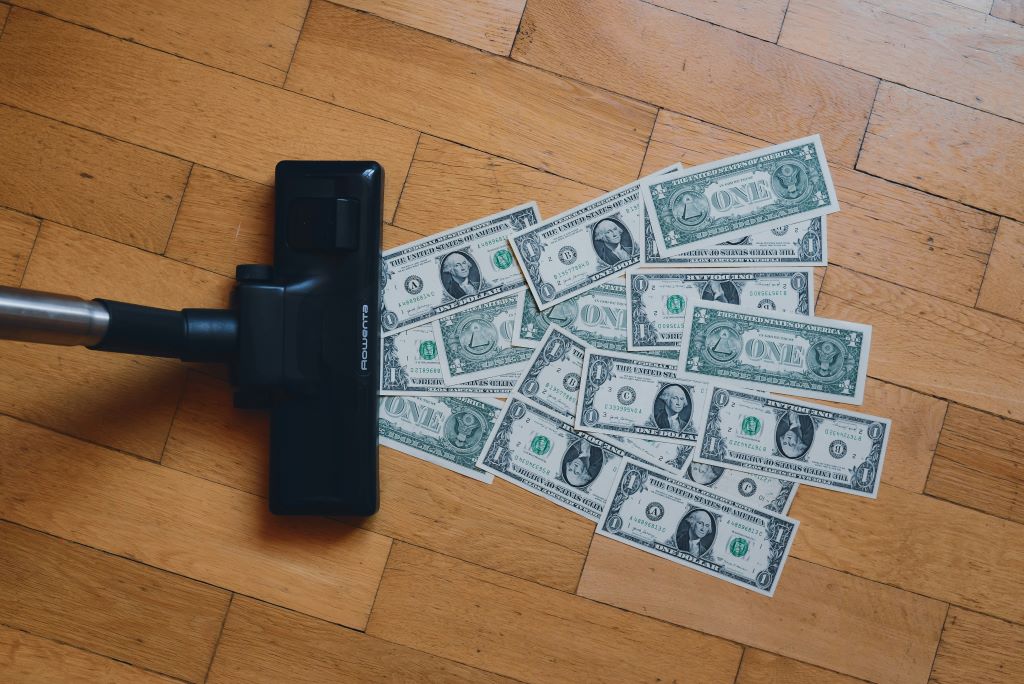
If you’ve noticed how expensive things are lately, you’re not alone. Inflation is currently a worldwide problem, impacting people, businesses, and investors across the globe. While normal inflation is a regular part of a healthy economy, rapid or sustained inflation can wear away purchasing power and disrupt financial plans. As we navigate the current economic landscape, understanding inflation and applying strategies to ease its effects is crucial for financial stability and success. And with rising prices being a popular topic of conversion lately, it’s important to understand the details of inflation. So, in today’s blog, we’re covering the ins and outs of inflation, including what it is, why it matters, and why the inflation rate is so high right now. Stick around, because we’re also sharing some helpful tips to cushion yourself a bit during times of high inflation.
What is Inflation and Why Does It Matter?
To better understand this article, you’ll first need to know what inflation is. To measure inflation, changes are tracked in the Consumer Price Index (CPI). The CPI reflects the average price level of a basket of goods and services commonly purchased by households. In layman’s terms, inflation refers to the general increase in prices and the decrease in purchasing power that money has. When inflation occurs, each unit of currency buys fewer goods and services. This then reduces the real value of money over time. But this erosion of purchasing power can have serious effects. It can impact consumers’ ability to afford essential goods, savings goals, and investment returns. Essentially, higher inflation rates mean you’re going to be paying more for everyday items such as food and gas.
Why is the Inflation Rate so High Right Now?
There are several reasons why we’re seeing high inflation right now, but one of the biggest reasons is due to the aftermath of Covid-19. During lockdowns, supply chains struggled while demand remained strong. Voya Financial© explains, “When the lockdowns ended, many started to go out again and buy things even though the supply chains were/are facing issues. This of course causes shortages and increased prices”.* Unfortunately, supply chains are still catching up from 2020. Therefore, we’re still dealing with inflation.
What is Hyperinflation?
Hyperinflation is an extreme form of inflation, with very rapid and out-of-control increases in prices. Oftentimes, hyperinflation can lead to the weakening of a country’s currency and severe economic instability. A historical example of hyperinflation took place in Hungary, just after World War II, when prices doubled every 15 hours.
What Causes Inflation?
There are various factors that can influence inflation, including:
- Demand-Pull Inflation: Happens when demand for goods and services exceeds supply. This leads to price increases as businesses raise prices to balance supply and demand.
- Cost-Push Inflation: Caused by increases in production costs, such as wages or raw materials. These increased costs are then passed on to consumers through higher prices.
- Monetary Policy: Central banks’ monetary policies, such as interest rate adjustments, can impact inflation. These policies influence borrowing costs, money supply, and demand.
What is the Current Inflation Rate?
According to Nerdwallet, the current U.S. inflation rate is at 3.1% for the 12-month period leading up to January 2024.*

How to Calculate Inflation Rate
Inflation is calculated by comparing changes in the price level of a basket of goods and services over time. The comparison is then represented as a percentage. To do this, all you need is the value of a market basket in a certain year and the value of a market basket in a base year. Once you have these two values, place them in the below equation:
Value of Certain Year/Value of Base Year x 100 = Consumer Price Index (CPI), or in other words, the Inflation Rate represented as a percentage.
If math isn’t your thing, try using a CPI Inflation Calculator.*

How Does Inflation Affect Wages?
Inflation can lead to minor wage increases as employers adjust wages to keep up with rising prices. However, if wage increases don’t outpace inflation, real wages (adjusted for inflation) may decrease, impacting workers’ purchasing power.
How Does Inflation Impact Savings and Investments?
Inflation can reduce the real value of savings over time if interest rates on savings accounts don’t keep up with inflation. It could also affect investment returns, as assets may not appreciate sufficiently to overcome inflation.
How Does Inflation Affect the Economy?
Inflation affects the economy in several ways. It can reduce the purchasing power of money, change price signals, impact consumer and business confidence, redistribute income and wealth, and affect interest rates and investment decisions. Inflation can even potentially lead to economic instability in extreme cases.
What are the Effects of Inflation on Consumers?
Inflation eats away at the purchasing power of money, leading to higher prices for goods and services. This could reduce consumers’ real income, decrease the value of savings, and affect spending patterns and overall standard of living.

How Can Individuals Protect Themselves Against Inflation?
Inflation creates challenges for both individuals and investors, but there are strategies to help deal with its effects. Look into the following methods to help protect yourself against inflation:
Consider Diversifying Investments
Consider diversifying between different assets, such as stocks, bonds, real estate, and commodities. This can help relieve the impact of inflation on investment portfolios. Historically, stocks and real assets like real estate and commodities have helped protect against inflation.
Look Into Investing in Inflation-Protected Securities
Treasury Inflation-Protected Securities (TIPS)® are government bonds designed to adjust for inflation. TIPS provide investors with a fixed interest rate plus an inflation adjustment based on changes in the CPI.*
Consider Real Assets
Investing in real assets like real estate, infrastructure, and commodities could help preserve purchasing power and create returns. This is because real assets tend to hold or increase in value during inflationary periods.
Review and Adjust Financial Plans
Inflation can affect long-term financial goals, such as retirement savings and education funds. So, regularly reviewing and adjusting financial plans to account for inflation and changing economic conditions is essential for staying on track.
Manage Debt Wisely
Inflation can wear away the real value of debt over time, making it beneficial for borrowers. However, high inflation rates can also lead to higher borrowing costs. So, it’s crucial to manage debt levels and consider fixed-rate financing options.
Inflation is an ongoing economic force that could impact everyone. By understanding what causes inflation and applying careful financial strategies, you could help protect your finances during these times. Whether you choose to diversify your investments, look into TIPS, or carefully manage your debt, being proactive can help you deal with the challenges created by inflation.
High-interest loans can be expensive and should be used only for short-term financial needs, not long-term solutions. Customers with credit difficulties should seek credit counseling. The opinions expressed above are solely the author’s views and may or may not reflect the opinions and beliefs of the website or its affiliates. Cash Factory USA does not provide financial advice.
* This blog contains links to other third-party websites that are not endorsed by, directly affiliated with, or sponsored by Cash Factory USA. Such links are only for the convenience of the reader, user, or browser.